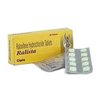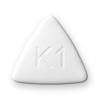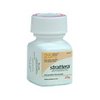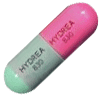 | Abilify (Aripiprazolum) Active Ingredient: Aripiprazole Abilify is used for treating agitation caused by schizophrenia or bipolar disorder,depression. |
INDICATIONS
Abilify is used for treating agitation caused by schizophrenia or bipolar disorder, depression . Abilify is an atypical antipsychotic. It affects certain substances in the brain.
INSTRUCTIONS
Use Abilify as directed by your doctor.
- Take Abilify by mouth with or without food.
- If you miss a dose of Abilify, take it as soon as possible. If it is almost time for your next dose, skip the missed dose and go back to your regular dosing schedule. Do not take 2 doses at once.
Ask your health care provider any questions you may have about how to use Abilify.
STORAGE
Store Abilify at room temperature, between 68 and 77 degrees F (20 and 25 degrees C). Store away from heat, moisture, and light. Keep Abilify out of the reach of children and away from pets.
MORE INFO:
Active Ingredient: Aripiprazole.
Do NOT use Abilify if:
- you are allergic to any ingredient in Abilify.
Contact your doctor or health care provider right away if any of these apply to you.
Some medical conditions may interact with Abilify. Tell your doctor or pharmacist if you have any medical conditions, especially if any of the following apply to you:
- if you are pregnant, planning to become pregnant, or are breast-feeding
- if you are taking any prescription or nonprescription medicine, herbal preparation, or dietary supplement
- if you have allergies to medicines, foods, or other substances
- if you ever had heart problems (eg, heart failure, irregular heartbeat, heart attack), low blood pressure, blood vessel problems, or stroke
- if you have a history of low white blood cell levels, including low white blood cell levels caused by any medicine
- if you have a history of seizures, dementia, Alzheimer disease, depression or other mental or mood disorders, or suicidal thoughts or attempts
- if you have trouble swallowing or a history of neuroleptic malignant syndrome (NMS)
- if you are dehydrated, have low blood volume, or are taking medicine for high blood pressure
- if you or a family member has a history of diabetes or you are very overweight.
Some medicines may interact with Abilify. Tell your health care provider if you are taking any other medicines, especially any of the following:
- Anticholinergics (eg, benztropine, methscopolamine) because the risk of their side effects may be increased by Abilify.
- Benzodiazepines (eg, lorazepam), clarithromycin, imidazole antifungals (eg, ketoconazole), quinidine, selective serotonin reuptake inhibitors (SSRIs) (eg, fluoxetine), or voriconazole because they may increase the risk of Abilify's side effects
- Carbamazepine, hydantoins (eg, phenytoin), or rifampin because they may decrease Abilify's effectiveness
- Alpha-blockers (eg, terazosin) because the risk of their side effects may be increased by Abilify.
This may not be a complete list of all interactions that may occur. Ask your health care provider if Abilify may interact with other medicines that you take. Consult your health care provider before you start, stop, or change the dose of any medicine.
Important safety information:
- Abilify may cause drowsiness, dizziness, or lightheadedness. These effects may be worse if you take it with alcohol or certain medicines. Use Abilify with caution. Do not drive or perform other possibly unsafe tasks until you know how you react to it.
- Do not drink alcohol while you are using Abilify.
- Consult your doctor before you use medicines that may cause drowsiness (eg, sleep aids, muscle relaxers) while you are using Abilify; it may add to their effects. Ask your pharmacist if you have questions about which medicines may cause drowsiness.
- Abilify may cause dizziness, lightheadedness, or fainting; alcohol, hot weather, exercise, or fever may increase these effects. To prevent them, sit up or stand slowly, especially in the morning. Sit or lie down at the first sign of any of these effects.
- Do NOT use more than the recommended dose or use more often than prescribed without checking with your doctor.
- Symptoms may include fever; stiff muscles; confusion; abnormal thinking; fast or irregular heartbeat; and sweating. Contact your doctor at once if you have any of these symptoms.
- Do not become overheated or dehydrated in hot weather or while you are being active; heatstroke may occur.
- Abilify may lower the ability of your body to fight infection. Avoid contact with people who have colds or infections. Tell your doctor if you notice signs of infection like fever, sore throat, rash, or chills.
- Abilify may raise your blood sugar or increase your risk of developing diabetes. High blood sugar may make you feel confused, drowsy, or thirsty. It can also make you flush, breathe faster, or have a fruit-like breath odor. If these symptoms occur, tell your doctor right away.
- Diabetes patients - Abilify may affect your blood sugar. Check blood sugar levels carefully. Ask your doctor before you change the dose of your diabetes medicine.
- Lab tests, including fasting blood sugar levels and complete blood cell counts, may be performed while you use Abilify. These tests may be used to monitor your condition or check for side effects. Be sure to keep all doctor and lab appointments.
- Use Abilify with caution in the elderly; they may be more sensitive to its effects.
- Abilify should be used with extreme caution in children; safety and effectiveness in children have not been confirmed.
- Pregnancy and breast-feeding: It is not known if Abilify can cause harm to the fetus. If you become pregnant, contact your doctor. You will need to discuss the benefits and risks of using Abilify while you are pregnant. It is not known if Abilify is found in breast milk. Do not feed breast while taking Abilify.
All medicines may cause side effects, but many people have no, or minor, side effects.
Check with your doctor if any of these most common side effects persist or become bothersome:
Dizziness; drowsiness; headache; nausea; vomiting.
Seek medical attention right away if any of these severe side effects occur:
Severe allergic reactions (rash; hives; itching; difficulty breathing; tightness in the chest; swelling of the mouth, face, lips, or tongue); abnormal thinking; chest pain; confusion; fainting; fast, slow, or irregular heartbeat; fever, chills, sore throat; increased sweating; involuntary movements of the tongue, face, mouth, jaw, arms, legs, or back (eg, chewing movements, puckering of mouth, puffing of cheeks); loss of control over urination; loss of coordination; muscle tremor, jerking, or stiffness; one-sided weakness; seizures; severe or persistent restlessness; shortness of breath; swelling of the hands, ankles, or feet; symptoms of high blood sugar (eg, increased thirst, urination, or appetite; unusual weakness); trouble swallowing; trouble walking; unusual bruising; unusual tiredness or weakness; vision or speech changes.
This is not a complete list of all side effects that may occur. If you have questions about side effects, contact your health care provider.
 DepakoteDepakote is used to treat various types of seizure disorders.as low as $0.83
DepakoteDepakote is used to treat various types of seizure disorders.as low as $0.83 RalistaRalista (raloxifene) is used for treatment and prevention osteoporosis in concerning by the period after a menopause of the woman.as low as $1.9
RalistaRalista (raloxifene) is used for treatment and prevention osteoporosis in concerning by the period after a menopause of the woman.as low as $1.9 KytrilKytril is used to prevent nausea and vomiting that may be caused by medicine to treat cancer (chemotherapy or radiation).as low as $2.05
KytrilKytril is used to prevent nausea and vomiting that may be caused by medicine to treat cancer (chemotherapy or radiation).as low as $2.05 StratteraStrattera is used for treating attention-deficit/hyperactivity disorder (ADHD).as low as $0.58
StratteraStrattera is used for treating attention-deficit/hyperactivity disorder (ADHD).as low as $0.58 ReminylReminyl (Galantamine) is a cholinesterase inhibitor that works by increasing the amount of a certain substance (acetylcholine) in the brain, which reduces symptoms of dementia in patients with Alzheimer disease.as low as $1.94
ReminylReminyl (Galantamine) is a cholinesterase inhibitor that works by increasing the amount of a certain substance (acetylcholine) in the brain, which reduces symptoms of dementia in patients with Alzheimer disease.as low as $1.94 HydreaHydrea (Hydroxyurea) is used to treat melanoma, chronic myelocytic leukemia, ovarian and primary squamous cell cancer, carcinoma of the head and neck (excluding the lip), chronic myelogenous leukemia, sickle cell anemia. as low as $1.71
HydreaHydrea (Hydroxyurea) is used to treat melanoma, chronic myelocytic leukemia, ovarian and primary squamous cell cancer, carcinoma of the head and neck (excluding the lip), chronic myelogenous leukemia, sickle cell anemia. as low as $1.71